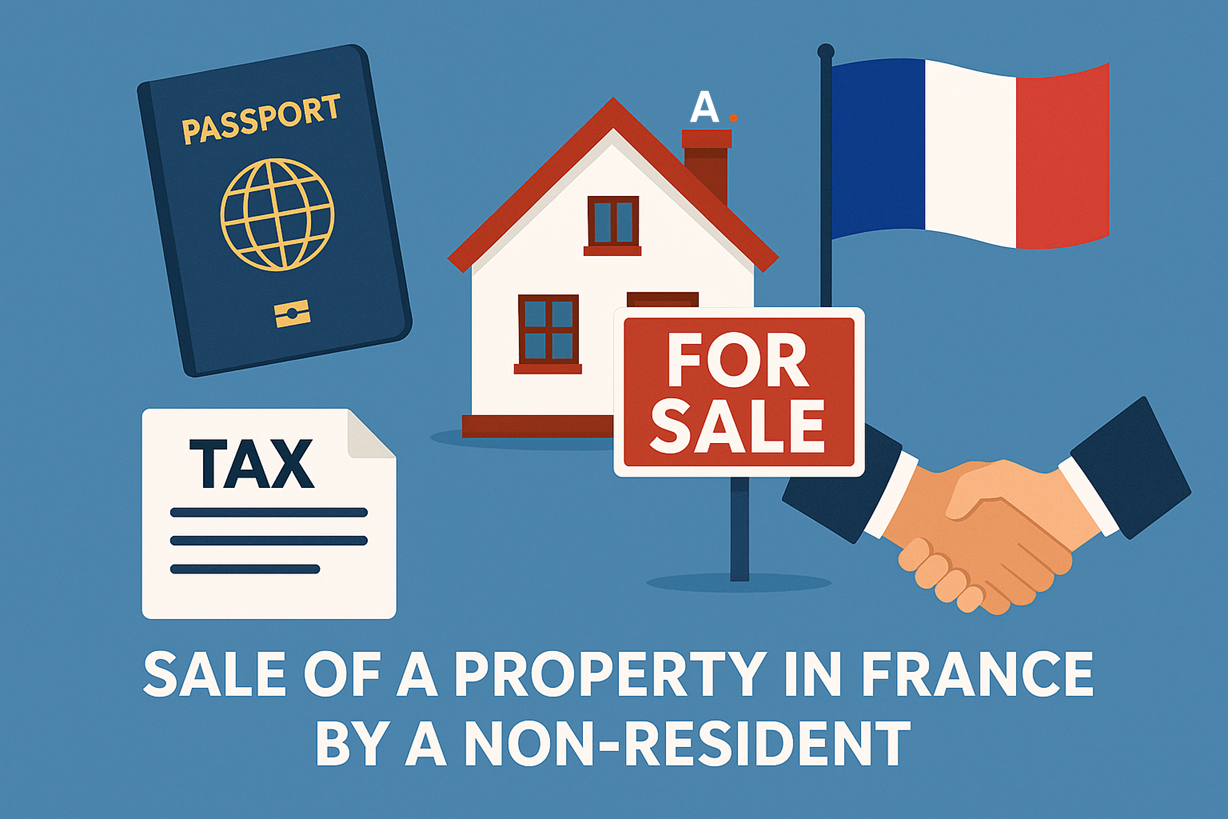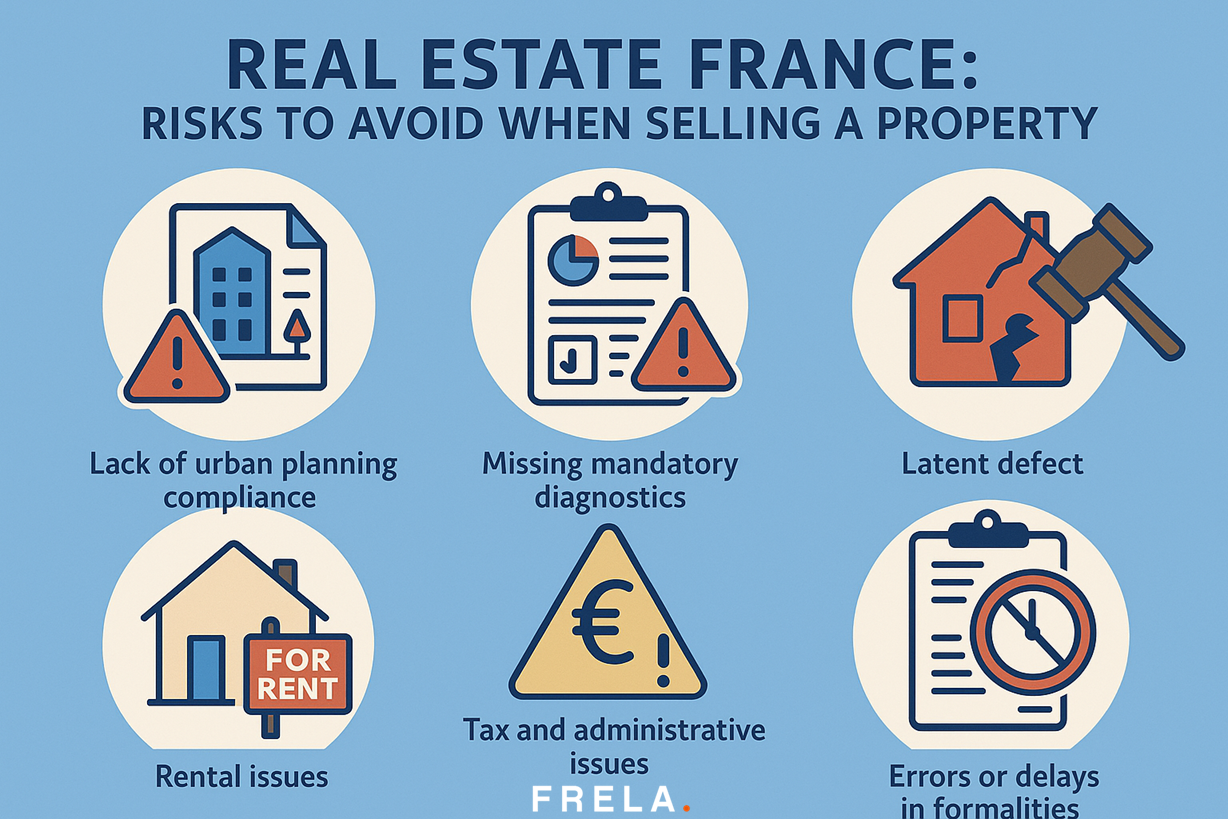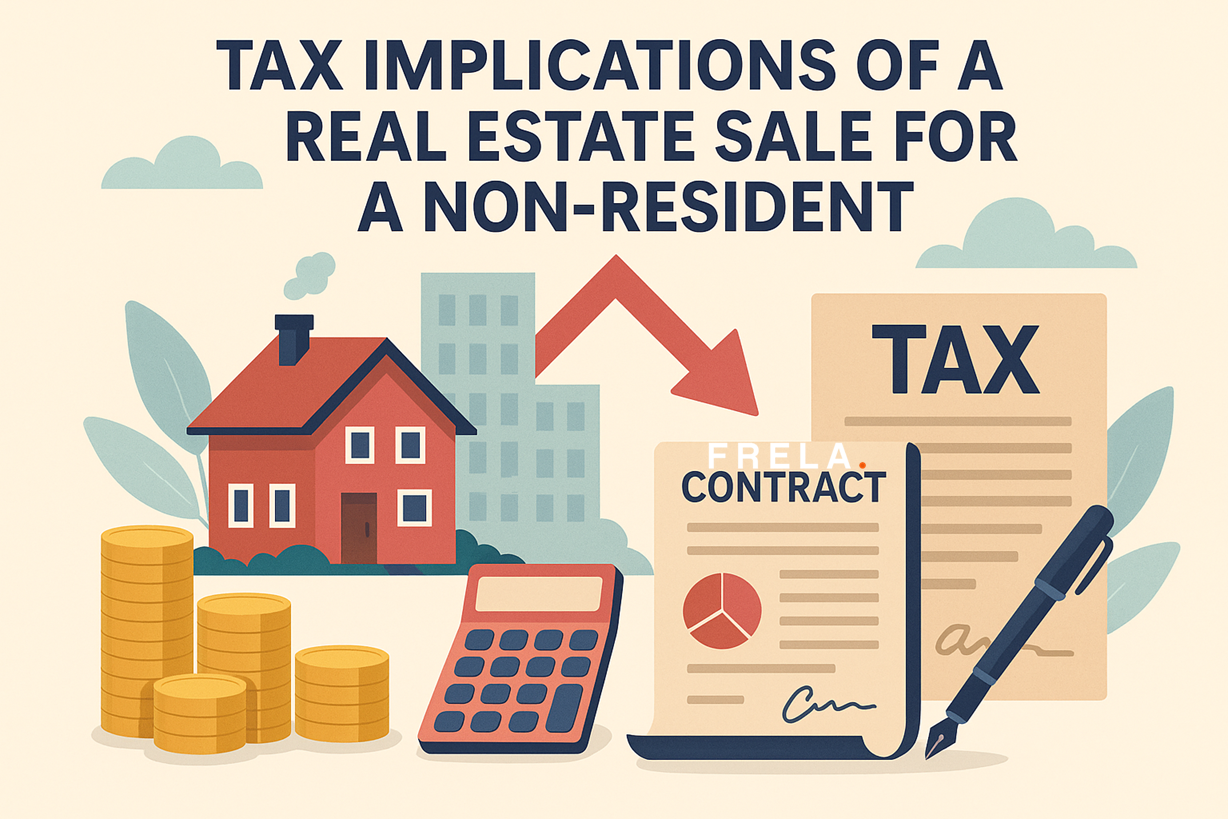Sale of a property in France by a non-resident: legal steps & specific precautions
When a non-resident expatriate or foreign investor decides to sell a property in France, they must navigate a precise legal process and take into account specific tax rules. This transaction is exclusively subject to French law, even if the seller resides abroad.


Legal steps in selling real estate for a non-resident in France
Selling a property in France involves several key phases, similar for a resident or a non-resident, with some practical adjustments if the seller is abroad. The main legal steps are: the sales mandate, the preliminary sales agreement (or promise of sale) and the final deed of sale.
Mandate to sell (sale):
The seller can entrust a mandate to a professional (real estate agent or lawyer in real estate transaction) for the sale of his property. The mandate, whether exclusive or simple, authorises this agent to look for buyers and to negotiate on his behalf. The non-resident seller will have an interest in defining the conditions (minimum price, fees) and choosing a trusted agent who masters the seller’s language and understands his objectives. An attorney can, for example, legally secure the transaction while managing the marketing.
Preliminary sales agreement:
Once a buyer has been found and agreed on the price, a preliminary contract is signed. The most common is the sales agreement, which is firmly binding on both parties (synallagmatic promise). Under this contract, the seller undertakes to sell and the buyer to buy on the agreed terms, subject to any suspensive clauses (for example, the buyer obtaining a loan). A sum of about 5 to 10% of the price (security deposit or immobilization indemnity) is generally paid by the buyer when the agreement is signed. The preliminary agreement specifies the deadline for completing the final sale (often 2 to 3 months) and lists the mandatory documents attached (technical diagnostics, urban planning documents, etc.).
Important: after signing, the non-professional buyer benefits from a legal withdrawal period of 10 days during which he can renounce without penalty (SRU Law). After this period, if the conditions precedent are lifted, the sale becomes firm. In the event of an unjustified default by the buyer, the seller may retain the security deposit as compensation (unless otherwise stipulated).
Authentic deed of sale (final):
This is the final conclusion of the transaction, which must be received by a French notary. The authentic deed of sale is signed in person or by power of attorney by the seller and the buyer, usually before the notary of the buyer’s choice (the seller may, however, be assisted by his own notary, the two notaries sharing the fees at no additional cost). The notary, a public officer, prepared the deed in advance by gathering all the necessary documents: the seller’s title deed, civil status, urban planning documents, mortgage situation, technical diagnostics, the municipality’s right of pre-emption, etc. On the day of signing, the notary reads the deed and verifies the identities, then collects payment of the price. The non-resident seller must ensure that he or she has provided an international bank account number for the transfer of funds (the sale being in euros, and if applicable, provide for the time required for conversion and transfer abroad). If the seller cannot be physically present, he or she should have provided for an authentic power of attorney authorizing a third party (a notary’s clerk, for example) to sign on his or her behalf. This power of attorney must be drawn up either by a local notary and then apostilled, or via the France consulate in the country of residence. Once the deed has been signed and the price paid, the notary hands over the keys to the buyer, publishes the sale with the Land Registry Service and pays any creditors (for example, repayment of a mortgage from the seller). The seller then receives a detailed sales account and, subsequently, a copy of the registered authentic deed.
Each step must be carried out rigorously. For a non-resident, remote coordination with the agent, lawyer and notary is essential. It is recommended to anticipate the specific formalities (power of attorney, certified translation of civil status documents if necessary, etc.) in order to avoid any delay in the sales schedule.
Specific precautions for the non-resident seller
Selling a property in France while residing abroad requires some additional precautions, particularly on the tax and administrative front, to comply with French obligations and secure the transaction.
Mandatory tax representation:
French law requires certain non-resident sellers to appoint an accredited tax representative who will be the intermediary with the tax authorities for the calculation and payment of capital gains tax. In practice, any non-resident who sells real estate in France must appoint such a representative, subject to exceptions for exemption.
The automatic exemption cases are: 1) the seller resides in an EU or EEA country that has an administrative assistance agreement with the France (e.g. a resident of the European Union, Iceland or Norway does not have this obligation); 2) the sale price is ≤ €150,000 per seller; 3) the sale is exempt from capital gains because of the length of time the property has been held (more than 22 years for income tax and 30 years for social security contributions). Apart from these situations, the seller must call on a tax representative before the sale: this can be a specialised company approved by the tax authorities, a bank in France, the buyer (if the latter is tax domiciled in France), or any other person domiciled in France and approved, excluding notaries and lawyers (who cannot be tax representatives themselves). In practice, notaries frequently collaborate with tax representation companies (such as SARF, TEVEA, etc.) to complete this formality. The tax representative is liable to the Treasury: he verifies the calculation of the taxable capital gain and guarantees the payment of the corresponding tax. Its fees (generally a few hundred euros, varying according to the complexity and the sale price) are paid by the seller. It is prudent to contact the tax representative as soon as the agreement is signed to prepare the file (collection of deductible work invoices, proof of the purchase price, etc.).
Reporting obligations and tax formalities:
Being a non-resident does not exempt you from filing tax returns related to the sale. On the day of the signing of the authentic deed, the notary (or the tax representative) draws up a real estate capital gains declaration (form 2048-IMM) in the name of the seller and pays the corresponding tax. This declaration must in principle be filed within one month of the placement.meilleurtaux.com transfer, but the intervention of the notary guarantees compliance with this legal deadline. If the capital gain realised is fully exempt (for example, property held for more than 30 years, or other reason for exemption), or if the sale price is less than €15,000, no capital gain declaration is required. On the other hand, in the event of a taxable capital gain, the deduction made by the notary is dischargeable: the non-resident seller does not have to report this capital gain on his annual French tax return. In other words, the tax is deducted at source at the time of the sale and definitively settles the tax due in France on this gain. However, all supporting documents should be kept in case the French tax authorities carry out an a posteriori audit (the tax representative also keeps a copy of the file).
In addition, depending on the seller’s country of tax residence and the applicable tax treaty, the seller will have to check whether he must declare this gain in his country and whether he will benefit from a tax credit equal to the French tax paid, in order to avoid double taxation. Most bilateral tax treaties follow the OECD model, which provides that capital gains on real estate are taxable in the country where the property is located, in this case the France, and that the country of residence eliminates double taxation (via a tax credit or exemption). Thus, a non-resident who has paid capital gains tax in France generally does not have any additional tax on this gain in his country, or can obtain a deduction equivalent to the French tax. It is recommended to consult a tax professional to ensure the specific treatment according to the country of residence.
Power of attorney and signing logistics:
As mentioned, if the seller cannot travel for the signing of the compromise or the final deed, he must anticipate the establishment of powers. A power of attorney for the compromise can usually be under private signature, but for the authentic deed, it must be authenticated (by a local notary + apostille, or made before a consul of France). Similarly, provide for the translation of legal documents if the seller is not French-speaking, in order to understand the exact content before signing or mandating someone. It is possible to ask the notary for a draft deed in advance and an unofficial translation if necessary.
Coordination of the transfer of funds:
A non-resident seller must inform the notary public of how he or she wishes to receive the proceeds of the sale. In general, the notary can transfer the funds to a foreign bank account (SEPA zone or non-SEPA). An IBAN/BIC must be provided and possibly additional information for transfers outside the euro area. Check with your foreign bank for any fees or delays. In the event of an exchange control in the country of residence, make sure that you have the repatriation formalities. In France, capital transfers are free but subject to anti-money laundering regulations: the notary will have to identify the beneficial owner of the funds and ensure the lawful origin of the funds (which, in the case of a sale, is obvious since the funds come from the buyer). For large amounts, an administrative transfer declaration is no longer required above a certain threshold but it remains prudent to be able to justify the receipt of large sums in your country (in particular with regard to your own tax authorities).
Personal documentation:
The non-resident seller must provide the notary with various civil and tax documents. For example, a copy of their passport, proof of address abroad, the marriage contract or matrimonial regime if applicable (to verify the spouse’s agreement if necessary), and their French tax identification number. If he does not have one (because he has never been taxed in France), the notary will be able to obtain one (form for non-residents) in order to register the capital gain. You will also have to provide the supporting documents related to the property: title deed (previous deed of purchase or inheritance), latest property tax notices and housing tax, and if it is a condominium dwelling, the documents relating to the co-ownership (co-ownership regulations, latest minutes of the general meeting, etc.). Preparing these elements well in advance facilitates the notary’s work and avoids delays.
In summary, the specific precautions of the non-resident consist mainly of complying with French tax obligations (tax representative, capital gains declaration) and anticipating the practical constraints of distance (mandating representatives to sign and receive the funds). With good support (notary, lawyer, tax representative) and meticulous preparation, a real estate sale in France can take place smoothly even from abroad.
About the Author :
Business lawyers, bilingual, specialized in acquisition law; Benoit Lafourcade is co-founder of Delcade lawyers & solicitors and founder of FRELA; registered as agents in personal and professional real estate transactions. Member of AAMTI (main association of French lawyers and agents).
FRELA : French Real Estate Lawyer Agency, specializing in acquisition law to secure real estate and business transactions in France.
Paris, 15 rue Saussier-Leroy, Paris
Bordeaux, 24 Rue du manège, 33000 Bordeaux
Lille, 40 Theater Square, 59800 Lille

This article is provided for general information only and may not reflect the most recent legal or tax developments. It does not constitute legal advice. Please contact us for personalised guidance before making any decision.




